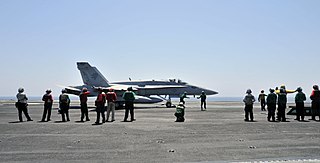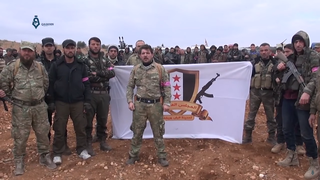Related Research Articles

Ansar al-Islam in Kurdistan, simply called Ansar al-Islam, is a Kurdish Islamist militant and separatist group. It was established in northern Iraq around the Kurdistan Region by Kurdish Islamists who were former Taliban and former Al-Qaeda volunteers, which were coming back from Afghanistan in 2001 after the Fall of Kabul. Its motive is to establish an Islamic state around the Kurdistan region and to protect Kurdish people from other armed insurgent groups. It imposed strict Sharia in villages it controlled around Byara near the Iranian border.
A service star is a miniature bronze or silver five-pointed star 3⁄16 inch (4.8 mm) in diameter that is authorized to be worn by members of the eight uniformed services of the United States on medals and ribbons to denote an additional award or service period. The service star may also be referred to as a campaign star or battle star depending on which award the star is authorized for and the manner in which the device is used for the award.
The Armed Forces Expeditionary Medal (AFEM) is a military award of the United States Armed Forces, which was first created in 1961 by Executive Order of President John F. Kennedy. The medal is awarded to members of the U.S. Armed Forces who, after July 1, 1958, participated in U.S. military operations, U.S. operations in direct support of the United Nations, or U.S. operations of assistance for friendly foreign nations.

The Iraq Campaign Medal (ICM) is a military award of the United States Armed Forces which was created by Executive Order 13363 of U.S. President George W. Bush on 29 November 2004, and became available for general distribution in June 2005. The medal was designed by the U.S. Army Institute of Heraldry and was awarded during the Iraq War, from 19 March 2003 to 31 December 2011.

The Global War on Terrorism Service Medal (GWOT-SM) is a military award of the United States Armed Forces which was created through Executive Order 13289 on 12 March 2003, by President George W. Bush. The medal recognizes those military service members who have supported operations to counter terrorism in the War on Terror from 11 September 2001, to a date yet to be determined.
The Global War on Terrorism Expeditionary Medal (GWOT-EM) is a United States Armed Forces award created by George W. Bush on 12 March 2003, through Executive Order 13289. The medal recognizes those military service members who have deployed overseas in direct service to the War on Terror from 11 September 2001 to a date to be determined. Prior to 30 April 2005, the medal was awarded for service within Iraq and Afghanistan, but has been replaced with the Iraq Campaign Medal and Afghanistan Campaign Medal and serves primarily as recognition for personnel who have deployed in support of the War on Terror to locations beyond Iraq and Afghanistan. In a similar fashion the Inherent Resolve Campaign Medal is issued for service in the fight against ISIS, with eligibility retroactive to 15 June 2014.
The history of the Kurdistan Workers' Party (PKK) began in 1974 as a Marxist–Leninist organization under the leadership of Abdullah Öcalan. In 1978 the organization adopted the name "Kurdistan Workers Party" and waged its low-level Urban War in Turkish Kurdistan between 1978 and 1980. The PKK restructured itself and moved the organization structure to Syria between 1980 and 1984, after the 1980 Turkish coup d'état. The Kurdish-Turkish conflict began in earnest in 1984. The rural-based insurgency lasted between 1984 and 1992. The PKK shifted its activities to include urban attacks against Turkish military bases between 1993–1995 and later 1996–1999. Öcalan was captured in Kenya in early 1999. After a "self declared peace initiative of 1999", hostilities resumed in February 2004. 2013 saw another ceasefire, but the conflict resumed again in 2015 and has continued since.

The Kurdistan Free Life Party, or PJAK, is a Kurdish leftist anti-Islamic Republic of Iran armed militant group. It has waged an intermittent armed struggle since 2004 against the Iranian regime, seeking self-determination through some degree of autonomy for Kurds in Iran.
The Hood event refers to a 2003 military incident involving Turkey and the United States shortly after the American-led invasion of Iraq. On July 4, 2003, a group of Turkish soldiers operating in Iraqi Kurdistan were captured by American troops and, with hoods covering their heads, were led away to be interrogated. Afterwards, American soldiers raided a Turkish safehouse in Sulaymaniyah and seized 15 kilograms (33 lb) of explosives in addition to sniper rifles, grenades, and maps of Kirkuk with circles drawn around positions near the local governor's building. Turkey lodged a diplomatic protest with the United States, and the Turkish soldiers were then released after spending 60 hours in American custody. Turkey has been involved in a long-running conflict with the Kurds, and one Iraqi-Kurdish intelligence official claimed that the Turkish soldiers had been linked to a plot to assassinate the newly elected governor of Kirkuk in order to destabilize the region, opening the way for the Turkish military to intervene.

Combined Joint Special Operations Task Force – North (CJSOTF–N), also known as Task Force Viking, was the U.S. joint task force responsible for the northern front during the initial period of the 2003 U.S. invasion of Iraq. It secured Kirkuk, Mosul, and the northern oil fields; prevented 13 Iraqi Army divisions from defending Baghdad or reinforcing defensive operations against American and British troops advancing in the south, and thwarted Turkish efforts to subvert Kurdistan.
Strategic reset was a policy framework designed to stop counterproductive U.S. engagement in a fragmenting Iraq and to strengthen the United States' stance throughout the Middle East. In military terms, "reset" refers to "a series of actions to restore units to a desired level of combat capability commensurate with future mission requirements."

The war on terror, officially the Global War on Terrorism (GWOT), is a global military campaign initiated by the United States following the September 11 attacks and is the most recent global conflict spanning multiple wars. The main targets of the campaign are militant Islamist movements like Al-Qaeda, Taliban and their allies. Other major targets included the Ba'athist regime in Iraq, which was deposed in an invasion in 2003, and various militant factions that fought during the ensuing insurgency. After its territorial expansion in 2014, the Islamic State militia has also emerged as a key adversary of the United States.

The Iran–PJAK conflict is an armed conflict between the Islamic Republic of Iran and Kurdish rebels of the Kurdistan Free Life Party (PJAK), which began in 2004. The group has carried out numerous attacks in the Kurdistan Province of Iran and provinces of Western Iran. PJAK is closely affiliated with the militant Kurdistan Workers' Party (PKK), the primary opponent of the Republic of Turkey in the Kurdish–Turkish conflict. PJAK has been designated as a terrorist organization by Iran, Japan, Turkey, and the United States.

On 22 September 2014, the United States officially intervened in the Syrian civil war with the stated aim of fighting the terrorist organization ISIS in support of the international war against it, code named Operation Inherent Resolve. The US currently continues to support the Syrian rebels and the Kurdish-led Syrian Democratic Forces opposed to both the Islamic State and Syrian president Bashar al-Assad.

Operation Shader is the operational code name given to the contribution of the United Kingdom in the ongoing military intervention against the Islamic State of Iraq and the Levant. The operation involves the British Army providing ground support and training to allied forces fighting against ISIL, the Royal Air Force providing humanitarian aid airdrops, reconnaissance and airstrikes, and the Royal Navy providing reconnaissance and airstrikes from the UK Carrier Strike group and escort to allied carrier battle groups.

On 15 June 2014, U.S. President Barack Obama ordered United States forces to be dispatched in response to the Northern Iraq offensive of the Islamic State (IS) as part of Operation Inherent Resolve. At the invitation of the Iraqi government, American troops went to assess Iraqi forces and the threat posed by ISIL.

Turkey's involvement in the Syrian Civil War began diplomatically and later escalated militarily. Initially, Turkey condemned the Syrian government at the outbreak of civil unrest in Syria during the spring of 2011; the Turkish government's involvement gradually evolved into military assistance for the Free Syrian Army in July 2011, border clashes in 2012, and direct military interventions in 2016–17, in 2018, in 2019, 2020, and in 2022. The military operations have resulted in the Turkish occupation of northern Syria since August 2016.

Operation Inherent Resolve (OIR) is the United States military's operational name for the international war against the Islamic State (IS), including both a campaign in Iraq and a campaign in Syria, with a closely related campaign in Libya. Through 18 September 2018, the U.S. Army's III Armored Corps was responsible for Combined Joint Task Force – Operation Inherent Resolve (CJTF—OIR) and were replaced by the XVIII Airborne Corps. The campaign is primarily waged by American and British forces in support of local allies, most prominently the Iraqi security forces and Syrian Democratic Forces (SDF). Combat ground troops, mostly special forces, infantry, and artillery have also been deployed, especially in Iraq. Of the airstrikes, 70% have been conducted by the military of the United States, 20% by the United Kingdom and the remaining 10% being carried out by France, Turkey, Canada, the Netherlands, Denmark, Belgium, Saudi Arabia, the United Arab Emirates, Australia and Jordan.
Operation Martyr Yalçın was a military operation conducted by the Turkish Air Force against Islamic State of Iraq and the Levant (ISIL) positions in Syria, and Kurdistan Workers' Party (PKK) positions in northern Iraq, on 24 and 25 July 2015.
In late July 2015, the third phase of the Kurdish–Turkish conflict between various Kurdish insurgent groups and the Turkish government erupted, following a failed two and a half year-long peace process aimed at resolving the long-running conflict.
References
- ↑ "DOD expands medal eligibility". Stars and Stripes. 2009-01-07. Retrieved 2009-01-06.
- ↑ "DOD officials expand eligibility for expeditionary medal". Air Force News Service. 2009-01-05. Archived from the original on 2012-07-17. Retrieved 2009-01-06.
- ↑ "U.S. military drone surveillance is expanding to hot spots beyond declared combat zones."
- ↑ "Global War on Terrorism Expeditionary (GWOT-E) Medal Approved Areas of Eligibility (AOE)" (PDF). Department of Defense. Retrieved 8 November 2015.